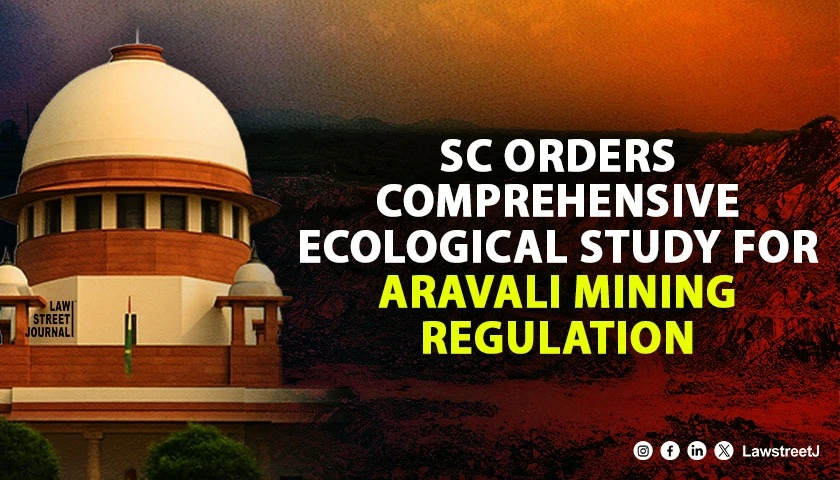New Delhi: The Supreme Court of India has delivered a significant judgment concerning the conservation and regulation of mining in the Aravali Hills and Ranges, spanning Delhi, Haryana, Gujarat, and Rajasthan. The apex court has directed the Ministry of Environment, Forest and Climate Change (MoEF&CC) to prepare a Management Plan for Sustainable Mining (MPSM) for the entire Aravali range through the Indian Council of Forestry Research and Education (ICFRE), similar to the comprehensive study conducted for Saranda and Chaibasa in the Singhbhum district of Jharkhand.
The judgment, authored by a Special Bench comprising Chief Justice of India B.R. Gavai, Justice K. Vinod Chandran, and Justice N.V. Anjaria, acknowledged the immense ecological significance of the range. The Court observed:
“In the present matter, we are concerned with the definition of Aravali Hills and Ranges and the need for proper conservation of the same in the States of Delhi, Haryana, Gujarat and Rajasthan. The Aravali Range spanning across the aforesaid four States is one of the oldest geological features on planet Earth. It is one of the oldest fold mountains in India. It is rich in wildlife, flora and fauna, and significantly influences the climate and biodiversity across North India.”
The Court further noted that scientific assessments establish that “the Aravali ecosystem acts as a ‘green barrier’ and forms an effective ‘shield’ against desertification by preventing the eastward spread of the Thar Desert towards the Indo-Gangetic plains, Haryana and western Uttar Pradesh.”
The Court considered the report submitted by the Committee constituted on May 9, 2024, to provide a uniform definition of the Aravali Hills and Ranges. The accepted definition designates “Aravali Hills” as any landform located in the Aravali districts with an elevation of 100 meters or more from the local relief, and “Aravali Range” as two or more Aravali Hills located within a proximity of 500 meters of each other.
While accepting the Committee’s recommendations on definitions and the prohibition of mining in core/inviolate areas with limited exceptions, the Court emphasized the need for a more detailed ecological assessment before allowing further sustainable mining. It observed:
“Taking all these aspects into consideration, we are of the considered view that while we propose to accept the report of the Committee constituted by the MoEF&CC pursuant to the orders passed by this Court, it would also be in the best interest of the ecology and environment that a similar study as was conducted for Saranda and Chaibasa, Singhbhum District, Jharkhand by ICFRE is also conducted for Aravali Hills and Ranges.”
Recognizing the ecological fragility of the region, the Court noted that the Aravali Hills and Ranges “harbour rich biodiversity, with twenty-two wildlife sanctuaries, four tiger reserves, the Keoladeo National Park, along with wetlands like Sultanpur, Sambhar, Siliserh, and Asola Bhati, and aquifers that recharge river systems including Chambal, Sabarmati, Luni, Mahi, and Banas.”
To balance development and conservation, the Court permitted ongoing legal mining activities to continue but imposed an immediate moratorium on new mining leases. “We further direct that till the MPSM is finalised by the MoEF&CC through ICFRE, no new mining leases should be granted,” the Court directed. It clarified that existing operations shall continue “in strict compliance with the recommendations made by the Committee in paragraph 8 of its Report.”
The Court mandated that the comprehensive MPSM must:
- Identify permissible mining areas, ecologically sensitive zones, conservation-critical zones, and restoration-priority areas where mining is either strictly prohibited or permitted only under exceptional, scientifically justified circumstances;
- Incorporate a thorough analysis of cumulative environmental impacts and the ecological carrying capacity of the region;
- Include detailed post-mining restoration and rehabilitation measures.
The MoEF&CC was directed to prepare the MPSM “for the entire Aravalis, i.e., the continuous geological ridge extending from Gujarat to Delhi, on the lines of the MPSM for Saranda.”
The matter will be reviewed once the MPSM is finalized.
Case Details:
Case Name: In Re: T.N. Godavarman Thirumulpad v. Union of India & Others
Case Number: Writ Petition (C) No. 202 of 1995
Coram: B.R. Gavai, CJI; K. Vinod Chandran, J.; N.V. Anjaria, J.
Date of Judgment: November 20, 2025
Advocates Appearing:
- For the Petitioner/Amicus Curiae: Mr. K. Parameshwar, assisted by Mr. M.V. Mukunda, Ms. Kanti, Ms. Raji Gururaj and Mr. Shreenivas Patil.
- For MoEF&CC (Union of India): Ms. Aishwarya Bhati, ASG.
- For the State of Haryana: Mr. Balbir Singh, Senior Counsel.
- For the State of Rajasthan: Mr. K.M. Nataraj, ASG.
- Other Counsel: Mr. A.N.S. Nadkarni, Senior Counsel (for the Federation of Associations of Mining in Rajasthan).













